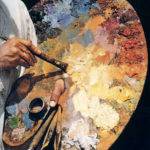Rhythmism Philosophy
Like Musists, Rhythmists see the world as made up of vibrations, but they focus primarily on beats and timing. Of course, drummers are the most likely followers of Rhythmism. The practicing Rhythmist is keenly aware of timing, acceleration, syncopation and timbre in all things.
Rhythmism History
Drumming is one of the oldest art forms still in existence. Traditional societies used drumming to communicate over long distances, to bring people into trance-like states, to worship gods and goddesses, and many other sociocultural phenomena. The first musical instruments were drums and have been the most fundamental element of nearly all forms of group-based music in history, with a few exceptions, such as the classical quartet. Drums have been particularly popular in the modern era, first with jazz music and later with rock and pop. Electronic music is especially dependent upon drums (or rather, electronic beats meant to sound like acoustic drums). One could make the cheeky supposition that drums and modernism are closely linked – the more drums, the more modern!
Rhythmist Practice
Most Rhythmists will practice their religion by playing drums of some sort, but also by listening to rhythmic music. Group drum circles are a fundamental form of spiritual communion and community as well. Dancing is another popular pastime among Rhythmists, and sexual congress is certainly an option for those inclined to bring an element of religion into the bedroom.
Rhythmisms
Life is like dancing. If we have a big floor, many people will dance. Some will get angry when the rhythm changes. But life is changing all the time.
— Don Miguel Ruiz
Life is about rhythm. We vibrate, our hearts are pumping blood, we are a rhythm machine, that’s what we are.
— Mickey Hart
One can ascend to a higher development only by bringing rhythm and repetition into one’s life. Rhythm holds sway in all nature.
— Rudolf Steiner
Rhythmism Community
Get ordained as a Rhythmist Minister










